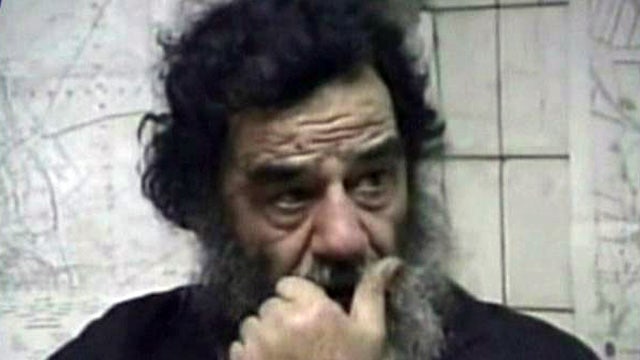Inside the hunt for Saddam Hussein
Insight from a key commander who helped capture the Iraqi dictator
Saddam Hussein was an inept dictator during his final years in charge, thought 9/11 would bring Iraq and America closer together and took partial blame for his eventual fall from power after the 2003 U.S.-led invasion, according to a new book by one of the men who interrogated the ex-Iraqi president.
The revelations are contained in the upcoming John Nixon book “Debriefing the President: The Interrogation of Saddam Hussein.” Nixon was a CIA analyst in Iraq who had been assigned the task of finding Hussein, and then getting information out of him. But he quickly found that “Saddam seemed clueless.”
“He was inattentive to what his government was doing, had no real plan for the defense of Iraq and could not comprehend the immensity of the approaching storm,” Nixon wrote in the book excerpt published by The Daily Mail.
SADDAM WHINED ABOUT SCRAPES AND BRUISES, BOOK SAYS
Hussein, who was hanged and killed in 2006 for crimes against humanity, was frequently defiant while being interviewed and even mocked the U.S. rationale for the war: that Iraq possessed weapons of mass destruction.
“You found a traitor who led you to Saddam Hussein. Isn’t there one traitor who can tell you where the WMDs are?” Hussein said shortly after he was found hiding, dirty and grizzled, inside an underground “spider hole” on Dec. 13, 2003.
The sadistic despot said Iraq had never thought about using WMDs and questioned why “anyone with full faculties” would deploy chemical weapons unprovoked.
“Iraq is not a terrorist nation,” Hussein told Nixon during one session. "We did not have a relationship with [Usama] bin Laden, and did not have weapons of mass destruction... and we’re not a threat to our neighbors. But the American president [George W. Bush] said Iraq wanted to attack his daddy and said we had ‘weapons of mass destruction.’”
Asked about the 1988 Halabja massacre, in which thousands of mostly Kurdish civilians were killed by Iraqi chemical weapons during the Iran-Iraq war, Hussein grew angry.
“Then he turned to me and sneered: ‘But I did not make that decision,’” Nixon wrote.
The carnage in Halabja allegedly infuriated Hussein, not because of the thousands killed, but instead, because it provided Iran with a propaganda coup.
Hussein could also be candid, Nixon wrote, and did not absolve himself of all responsibility for his downfall.
“The spirit of listening and understanding was not there – I don’t exclude myself from this blame,” Hussein said of his frequently antagonistic relationship with the international community.
As Nixon questioned Hussein, he said it became clear the CIA profile of the Iraqi leader had been wrong on many fronts.
“I asked about the CIA’s belief that Saddam suffered great pain from a bad back and had given up red meat and cigars,” Nixon wrote. “He said he didn’t know where I was getting my intelligence, but it was wrong. He told me he smoked four cigars every day and loved red meat. He was also surprisingly fit.”
A little more than four months after 9/11, President Bush named Iraq as a member of the “Axis of Evil” during his State of the Union address. Hussein, however, had initially assumed the Al Qaeda-directed terror attacks would bring the U.S. and Iraq closer together. Hussein had believed his secular government would be seen by America as an ally in the war on fundamentalist terror.
Instead, fewer than two years after the attacks, the U.S.-led coalition deposed Hussein.








































